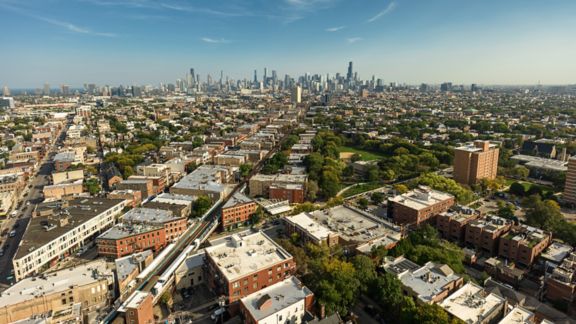Announcing the Chicago Public Safety DataHub, a New Website Tracking Crime Trends & Public Perceptions
For Media Inquiries:
The free, non-partisan resource—developed by the Civic Committee of the Commercial Club of Chicago and NORC at the University of Chicago—is the latest milestone in the Civic Committee’s ambitious strategy to reduce shootings and homicides in the city of Chicago.
CHICAGO, July 14, 2025 — The Civic Committee of the Commercial Club of Chicago and NORC at the University of Chicago today launched the Chicago Public Safety DataHub—an innovative online resource that tracks the most recent data on the city’s violent crime and the strategic efforts of community, law enforcement, and civic leaders to reduce it. The site is designed to be a non-partisan, user-friendly resource for all Chicagoans concerned with making the city safer.
The DataHub features two complementary components:
- Public safety data from the City of Chicago, Cook County, and peer cities that present a holistic view of the criminal justice system not available from any other source
- Implementation data from the Civic Committee’s Public Safety Task Force strategy to tackle the most intractable near- and long-term barriers to a safer Chicago
“The business community has an important role to play in unlocking Chicago’s full potential, and the DataHub is one of our most important investments,” Civic Committee Public Safety Task Force co-chairs Mark Hoplamazian, Hyatt Hotels president and CEO, and Eric Smith, BMO vice chair, said. “Just as we look to data to drive our toughest business decisions, we knew from the launch of the Public Safety Task Force that we would need detailed and timely data tracking to provide transparency, accountability for results, and strategic perspective. Making the Chicago Public Safety DataHub publicly available is a huge step forward.”
The Civic Committee formed a Public Safety Task Force in October 2022 to identify ways for the business community to contribute to creating a safer Chicago for all. The Committee’s coordinated efforts complement and support the wide range of work other organizations are and have long been leading to improve public safety across the city. The task force identified ambitious five- and 10-year goals that can be achieved through the collective efforts of police and other public servants, violence interrupters, workforce and economic development experts, philanthropists, business and community leaders, and all other organizations and individuals working toward a safer Chicago. The launch of the DataHub, which tracks progress on all four pillars of that work, is the latest milestone in that strategy and an avenue to create accountability for results to Committee investors, private and public sector partners, and the general public. Those pillars include community violence intervention (CVI), hiring, public safety infrastructure, and community economic development.
“The Chicago Public Safety DataHub gives Chicago residents and other stakeholders across our region a vital new perspective on the many ways violence touches our communities and the hard, collaborative work so many are doing to stop it,” Derek Douglas, president of the Civic Committee and Commercial Club of Chicago, said. “NORC has been an incredible partner and we’re grateful for the many CVI, workforce, and civic groups that have helped drive this effort forward. Our hope is this new resource will help us better understand the factors at play and hold the business community and everyone else accountable as we continue to advance this line of our work.”
The launch of the DataHub coincides with the release of findings from a survey of Chicago residents’ perceptions of safety conducted using ChicagoSpeaks™, a representative survey panel of Chicagoans developed by NORC. The data include how safe residents feel at home, on the street, and in the presence of strangers, as well as their perceptions of the police. The survey will be repeated at regular intervals with the same panel of respondents to track how their perceptions of safety change over time and inform the evolution of the Civic Committee Public Safety Task Force strategy.
In line with national trends, the city has seen a significant drop in violent crime in the first quarter of 2025—the DataHub puts those numbers in context and will be a critical resource for tracking progress through summer 2025 and beyond. Public data aggregated on the DataHub includes shootings, homicides, and violent crimes; homicide clearance and felony conviction rates; unemployment rates and household income. These measures are tracked in interactive data displays that allow users to adjust timeframe and geographic focus and compare to peer city data.
“Building effective solutions to violence in Chicago requires a shared set of facts not just on outcomes, but on the drivers of those outcomes,” said NORC senior fellow and nationally recognized criminologist John Roman. “An easily accessible public source of data will inform shared, collaborative engagement with the challenges Chicago faces and foster greater transparency and trust.”
The DataHub is a dynamic resource, and the Civic Committee and NORC will add additional data sources over time.
“We are honored to be partnering with the Civic Committee on this important resource, and grateful for the insights and data provided by the Chicago business community. The Public Safety DataHub represents the very essence of what NORC stands for—delivering trustworthy data and analysis that informs decision-making on society’s most pressing challenges,” said Dan Gaylin, NORC president and CEO and a member of the Civic Committee’s Public Safety Task Force. “As a Chicago-based institution, we are proud to apply our expertise in data collection, integration, and visualization to help our hometown create meaningful change in our neighborhoods.”
This release is jointly issued by NORC at the University of Chicago and the Civic Committee of the Commercial Club of Chicago.
About the Project Partners
NORC at the University of Chicago conducts research and analysis that decision-makers trust. As a nonpartisan research organization and a pioneer in measuring and understanding the world, NORC has studied almost every aspect of the human experience and every major news event for more than eight decades. Today, NORC partners with government, corporate, and nonprofit clients around the world to provide the objectivity and expertise necessary to inform the critical decisions facing society.
Contact: For more information please contact Eric Young at NORC at young-eric@norc.org or (703) 217-6814 (cell).
The Civic Committee of the Commercial Club of Chicago—which comprises senior executives of the Chicago region’s leading employers—harnesses the full power of the business community through high impact programs and platforms that inspire collaborative action to make the Chicago region a better place for everyone to live, work, and do business.










